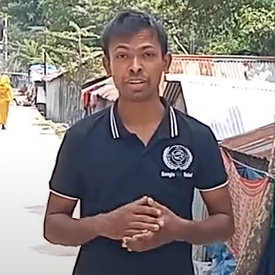Clean Water Role in Food Relief Success & Impact
- David Burgess
- Aug 15, 2024
- 7 min read
Updated: Aug 15, 2024
Key Takeaways
Clean water is essential for effective food relief programs, impacting agriculture, health, and community well-being.
Reliable access to clean water boosts agricultural productivity, leading to higher crop yields and food security.
Clean water reduces waterborne diseases, ensuring better health and nutrition for vulnerable populations.
Efficient water management and infrastructure are crucial for maintaining a consistent and safe food supply chain.
Addressing clean water challenges involves community involvement, technology, and partnerships with NGOs and governments.
Watch As Lotus Ministry Volunteers Install
A Pump Bringing Clean Water To Neglected Bangladeshis
Clean Water Role in Food Relief Success & Impact
The Critical Role of Clean Water in Food Relief
Clean water is the cornerstone of any successful food relief program. It affects every aspect of food production, from growing crops to ensuring that food is safe to eat. Without clean water, it's nearly impossible to achieve sustainable food security.
Boosting Agricultural Production and Irrigation
Agricultural production heavily relies on the availability of clean water. Crops need water to grow, and the quality and consistency of water supply directly impact crop yields. When farmers have access to clean water, they can irrigate their fields effectively, leading to higher productivity and better-quality crops.
For example, in regions where clean water is readily available, farmers can implement advanced irrigation techniques such as drip irrigation. This method conserves water while ensuring that crops receive the necessary hydration, thus boosting yields.
Health and Hygiene Factors
Besides boosting agricultural production, clean water is vital for maintaining proper health and hygiene. In food relief programs, clean water ensures that food is prepared safely, reducing the risk of foodborne illnesses. Moreover, it helps in maintaining personal hygiene, which is crucial in preventing the spread of diseases.
"Clean water reduces the incidence of waterborne diseases, which can severely affect the health and nutritional status of individuals, especially in vulnerable populations."
In emergency situations, such as natural disasters, access to clean water can be life-saving. It helps prevent outbreaks of diseases like cholera and dysentery, which are common in such scenarios.

Consider What It Would Be Like - You Can Be The Change
Impact on Food Relief Success
Improved Crop Yields and Sustainability
When clean water is available, farmers can achieve higher crop yields. This not only increases the food supply but also contributes to the sustainability of food relief programs. Sustainable agriculture practices, supported by reliable water sources, ensure that food production can continue without depleting natural resources.
For instance, in areas where water scarcity is an issue, implementing rainwater harvesting systems can provide a sustainable solution. These systems collect and store rainwater, which can then be used for irrigation during dry periods.
"Efficient water management ensures that the right quantity of water is available for agricultural purposes at the right time, which is crucial for the stability and productivity of food systems."
Ensuring Food Safety and Nutritional Quality
Clean water plays a crucial role in ensuring that the food provided in relief programs is safe to eat and nutritionally adequate. Water is used in various stages of food preparation, from washing vegetables to cooking meals. If the water is contaminated, it can lead to foodborne illnesses, which can be particularly dangerous for already vulnerable populations. For more information, you can read about the availability of clean water and its influence on food security.
Moreover, clean water is essential for maintaining the nutritional quality of food. For example, certain nutrients can be lost if food is washed or cooked in contaminated water. Therefore, ensuring access to clean water helps preserve the nutritional value of the food provided in relief programs.
Economic Benefits and Poverty Alleviation
Access to clean water can also have significant economic benefits. When farmers can produce more food due to reliable water sources, their income increases. This, in turn, can help alleviate poverty in communities that rely on agriculture as their primary source of livelihood.
Additionally, clean water reduces healthcare costs by preventing waterborne diseases. When people are healthy, they are more productive and can contribute more effectively to their communities and economies.
By addressing the issue of clean water, we can create a ripple effect that improves not only food security but also the overall economic well-being of communities.
By addressing the issue of clean water, we can create a ripple effect that improves not only food security but also the overall economic well-being of communities.

Lotus Ministry Trust Volunteers - Building Strong Communities
Building Stronger Communities
Clean water contributes to building stronger, more resilient communities. When people have access to clean water, they can focus on other essential aspects of life, such as education, work, and community development. This leads to a more stable and prosperous society. For more information, you can read about the availability of clean water and its influence on food security.
Moreover, community projects that focus on clean water solutions often bring people together, fostering a sense of unity and cooperation. For example, community-led initiatives to build and maintain water purification systems can empower local populations and create a sense of ownership and responsibility.
Challenges in Accessing Clean Water for Food Relief
Geographical Barriers
One of the significant challenges in accessing clean water for food relief is geographical barriers. In many remote or rural areas, natural obstacles such as mountains, rivers, and deserts can make it difficult to transport and distribute clean water. These geographical challenges require innovative solutions to ensure that even the most isolated communities have access to clean water.
Infrastructure Limitations
Infrastructure limitations are another critical barrier to clean water access. In many developing regions, the infrastructure needed to transport, store, and treat water is either outdated or nonexistent. This lack of infrastructure can lead to significant water losses and contamination, making it challenging to provide clean water for food relief programs.
For instance, broken or leaky pipes can result in water contamination and wastage. Addressing these infrastructure issues is crucial for ensuring a consistent and reliable supply of clean water.
Water Pollution and Contamination
Water pollution and contamination are significant challenges that can severely impact the availability of clean water. Industrial activities, agricultural runoff, and inadequate waste management can lead to water sources becoming polluted with harmful chemicals and pathogens.
For example, agricultural runoff containing pesticides and fertilizers can contaminate nearby water sources, making the water unsafe for consumption and irrigation. Similarly, industrial pollutants can introduce toxic substances into water supplies, posing serious health risks.
Addressing water pollution requires a multi-faceted approach, including stricter regulations, better waste management practices, and increased public awareness about the importance of protecting water sources.

Teamwork To Success
Strategies for Overcoming Clean Water Barriers
Despite the challenges, there are several strategies that can help overcome barriers to clean water access in food relief programs. Implementing these strategies can ensure that clean water is available to support agricultural production, health, and community well-being.
Implementing Efficient Water Management Systems
Efficient water management systems are crucial for ensuring that clean water is available when and where it is needed. These systems can include technologies such as drip irrigation, rainwater harvesting, and water recycling. By optimizing water use, these systems can help conserve water and reduce wastage.
For example, drip irrigation systems deliver water directly to the roots of plants, minimizing evaporation and runoff. This method can significantly reduce water usage while ensuring that crops receive the necessary hydration.
Integrating Technology for Water Purification
Advanced technologies for water purification can play a vital role in ensuring that water is safe for consumption and agricultural use. Technologies such as reverse osmosis, UV purification, and bio-sand filters can effectively remove contaminants from water, making it safe for use in food relief programs.
For instance, UV purification uses ultraviolet light to kill bacteria and viruses in water, providing a simple and effective solution for ensuring water safety. Similarly, bio-sand filters use natural materials to remove impurities from water, making it safe for drinking and cooking.
Community Involvement and Education
Community involvement and education are essential for the success of clean water initiatives. By involving local communities in water management projects, we can ensure that these projects are sustainable and meet the specific needs of the community. Education programs can also raise awareness about the importance of clean water and teach people how to protect and conserve water resources.
Organize community workshops to educate people about water conservation and hygiene practices.
Encourage community participation in building and maintaining water infrastructure.
Promote the use of simple water purification methods, such as boiling and filtration, at the household level.
Partnerships with NGOs and Government Bodies
Partnerships with non-governmental organizations (NGOs) and government bodies are crucial for addressing the clean water challenges in food relief programs. These partnerships can provide the necessary resources, expertise, and support to implement effective water management and purification solutions.
For example, NGOs can help mobilize communities, provide technical assistance, and secure funding for water projects. Government bodies can establish regulations, provide infrastructure, and ensure that water resources are managed sustainably.
By working together, NGOs, governments, and local communities can create a comprehensive approach to ensuring clean water access for food relief programs, ultimately enhancing food security and improving the quality of life for vulnerable populations.
By working together, NGOs, governments, and local communities can create a comprehensive approach to ensuring clean water access for food relief programs, ultimately enhancing food security and improving the quality of life for vulnerable populations.

Clean Water Flowing - Thanks to Lotus Ministry Volunteers
Conclusion: Making Clean Water a Priority in Food Relief
In conclusion, clean water is indispensable for the success and impact of food relief programs. It plays a vital role in agricultural productivity, health and hygiene, and overall community well-being. By addressing the challenges of clean water access through efficient water management systems, advanced purification technologies, community involvement, and strong partnerships, we can significantly enhance the effectiveness of food relief efforts.
Making clean water a priority in food relief not only ensures immediate food security but also contributes to the long-term sustainability and resilience of communities. As we continue to tackle global food insecurity, let us remember that clean water is a fundamental building block for a healthier, more prosperous world.
Frequently Asked Questions (FAQ)
Why is clean water essential for food relief programs?
Clean water is essential for food relief programs because it ensures the safe preparation and consumption of food, boosts agricultural productivity, and maintains the health and hygiene of vulnerable populations. Without clean water, food relief efforts cannot achieve their full potential.
How does clean water improve agricultural production?
Clean water improves agricultural production by providing a reliable and safe source of hydration for crops. This leads to higher crop yields, better-quality produce, and more sustainable farming practices. Techniques like drip irrigation and rainwater harvesting are particularly effective in maximizing water use efficiency.
What are some effective water management strategies?
Effective water management strategies include implementing drip irrigation systems, rainwater harvesting, and water recycling. These methods help conserve water, reduce wastage, and ensure that water is available when and where it is needed. Efficient water management is crucial for maintaining a consistent and safe food supply chain.
How can communities help in ensuring clean water access?
Communities can help ensure clean water access by participating in water management projects, maintaining local water infrastructure, and adopting water conservation practices. Education programs can raise awareness about the importance of clean water and teach simple purification methods, such as boiling and filtration, at the household level.












Comments